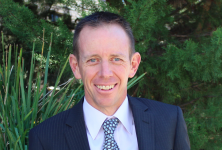Pill Testing Is Inevitable: An Interview with MP Shane Rattenbury

Despite the initial set back to Australia’s first government-sanctioned pill testing trial taking place, it appears that those behind the initiative are confident it will go ahead. According to them, the question is not if, but when.
On September 22, ACT health minister Meegan Fitzharris announced that her government had approved a trial of a pill testing service at a music festival. The minister recently stated the trial should be carried out, as a “purely punitive approach to drugs doesn’t work.”
The initial trial was scheduled to take place at the Spilt Milk festival on November 25. However, six weeks prior to the event, promoters pulled out of the trial stating that last minute paperwork that was required to hold it on land owned by the federal government had not been submitted.
The Safety Testing Advisory Service at Festivals and Events (STA-SAFE) consortium is an alliance of harm reduction organisations that will carry out the trial. They’re currently negotiating to hold it at the Groovin the Moo festival in May, which is held on land administered by the ACT government.
Broadening the scope
Earlier this month, ACT Greens leader Shane Rattenbury put forth to his fellow parliamentarians that consideration should also be given to establishing pill testing services at more permanent sites, which is a model he’s witnessed firsthand in the Netherlands.
Minister Rattenbury has explained that contrary to what the ACT Liberal opposition might state, pill testing, whether at a clinic or a festival, is not about condoning the use of illicit substances, but rather it’s an effective method of helping people avoid the risks associated with drug use.
It’s evidence-based
Pill testing services have been utilised in European countries, such as the Netherlands, Switzerland and Germany, for decades now. The European Union has actually produced pill testing best practice guidelines.
Indeed, the UK’s The Loop carried out their country’s first pill testing trial at a festival last year, and drug-related hospitalisations dropped dramatically.
These services are carried out by healthcare professionals using laboratory equipment. The owner of an illicit drug can review the results of a test within minutes, and then make an informed decision about whether they want to consume the drug, or dispose of it in an amnesty bin that’s provided.
Saving lives
The current push for pill testing services in Australia began early last year, after six drug-related deaths occurred at music festivals nationally over a 13 month period ending in December 2015.
However, since that time, a series of deaths has occurred in nightclub precincts on Melbourne’s Chapel Street and the Gold Coast, which were due to toxic batches of ecstasy that were a mixture of MDMA, and the more dangerous drug NBOMe.
And these deaths, that occurred outside the context of a music festival, might have been prevented if a more permanent pill testing service was available.
Sydney Criminal Lawyers® spoke with ACT Greens leader Shane Rattenbury about the healthcare benefits of pill testing services, the clinic-based model he witnessed in the Netherlands, and his belief that a trial will be held in the ACT in the not too distant future.
Firstly, the ACT government recently approved a pill testing trial to be held at a music festival. But, you’ve also suggested an alternative pill testing model to that proposal.
What does this model entail?
To be clear, I really support pill testing at music festivals. It’s obviously a key place where drug taking behaviour does take place.
However, earlier this year, I was in the Netherlands and I took the opportunity to observe pill testing while I was there. And the approach that they’ve taken is that they run them at medical clinics on an ongoing basis.
They do this in about 30 sites across the Netherlands. There’s a regular time. People can just turn up to a clinic, where they’re able to have their pills tested.
So, this is an alternative approach. I don’t think it’s exclusionary of pill testing at a festival. I think whether it’s at music festivals, dance parties, local venues, or elsewhere, pill testing does represent a chance to make these events safer for the people who attend them.
And I support all of those approaches.
So, if this model was successfully trialled, it would run alongside pill testing at music festivals?
Potentially, yes. In the Netherlands, they’ve moved away from running services at festivals. Because over time, they’ve built up a culture of people knowing that these clinics exists on a regular basis and people go in advance, and have their pills tested before a festival.
That’s the approach they’ve developed. In Australia, festivals are the obvious starting point. It is a key focal point. But, we know that festivals are not the only place people are taking drugs, and taking risks. So, we need to be thinking about this issue generally.
What would you say the further benefits of this sort of pill testing model would bring, compared to only holding these services at festivals and events?
There’s obviously a limit to festivals and events. They only take place infrequently. And people are taking drugs at other times.
So, pill testing at festivals and events is very positive. It’s a great start. But, as we develop this model, we need to think about how we can maximise the coverage, and maximise the opportunity for people to be engaged through a pill testing service.
As you’ve mentioned, you’ve actually seen these services operating firsthand in the Netherlands. What did you witness?
I actually sat in the clinic with the staff in Amsterdam, while I was over there earlier this year. And it was fascinating.
It underlines what people have argued for in Australia. This is not about saying to people it’s OK to take drugs. It’s actually quite a challenging conversation at times for the people who come along.
There’s a couple of things that happen. One is obviously the testing process happens. But also, the testers are able to glean a lot of information about where the drugs were purchased, and how much was paid.
So, they’re able to build a lot of knowledge about the drug market, which is very useful from both a health and a law enforcement point of view.
They’re also engaging with people about why they’re taking the drugs. And talking to people about harm minimisation strategies.
One example was people came with a pill that was very strong. So, testers talked to them about how strong it was. And told them not to take as much as they normally would.
It was a combination of information gathering, information sharing, and also, challenging people about why they were taking the drugs.
It’s certainly not a permissive or encouraging environment for drug taking, contrary to what some of the opponents in Australia suggest.
So, these services lead to conversations that open up the possibility of counselling services, which may then lead onto other drug treatment services if it was found problematic drug use was going on.
Certainly, one of the key issues is, this is often the first time someone who takes drugs will engage with a health professional over the issue. Because, the people who run these testing services are health professionals.
It is an opportunity to engage people both about the risks of drug taking, and sometimes the opportunity arises for a deeper conversation about why people are taking drugs: what it means for them, and perhaps some of the other problems in their lives. And that has the potential to be beneficial for people.
The pill testing trial that was to be held at Spilt Milk last month fell through due to the late submission of documentation.
Do you believe the Spilt Milk trial was simply called off because of missing documents or was there more to it than that?
To be honest, it’s been very hard to get to the bottom of why the trial did not go ahead at Spilt Milk. And there are a number of different versions of the story around.
The bottom line is, it was deeply disappointing that the pill testing did not go ahead at Spilt Milk, given that the government had gone through an extensive process of looking at the merits of it, extensive engagement with our own public health services, and with police.
We had formed a view that this is a positive harm minimisation initiative. And having done all of that work, and all of that due diligence, it was very frustrating to see it fall over at the end.
However, despite ACT government approval, there’s still major opposition to the trial, especially amongst the ACT Liberals.
Given the evidence from Europe that shows these services do save lives, why do you believe there is still such hesitation to implement them?
As you know, there is plenty of support from a range of health experts, academics, sections of law enforcement, and quite a few politicians here in the ACT. Certainly, both the local AMA and ACT policing provided their support for trial pill testing.
So, those who are opposed to it, are opposed to it on ideological grounds. They simply want an approach of saying, “Just Say No.” And what we have seen over the last thirty or forty years of the war on drugs is that it doesn’t work.
Neither the war on drugs, nor the Just Say No approach are successful strategies. We need to have a multipronged approach to dealing with drug taking behaviour, and harm minimisation is a really important part of that.
And lastly, in your opinion, how likely is it that one of these pill testing proposals will get off the ground in the ACT any time soon?
It’s almost certain it will happen soon. We have an excellent partner with the STA-SAFE coalition, who have the right equipment, and the right expertise to conduct this. We now have government support for it to go ahead.
It’s simply a matter of working with the right event promoter to make sure we get the logistics sorted out. I think it’s inevitable that it will happen quite soon.
Minister Rattenbury thanks very much for taking the time out to speak with us today.
Thank you.







